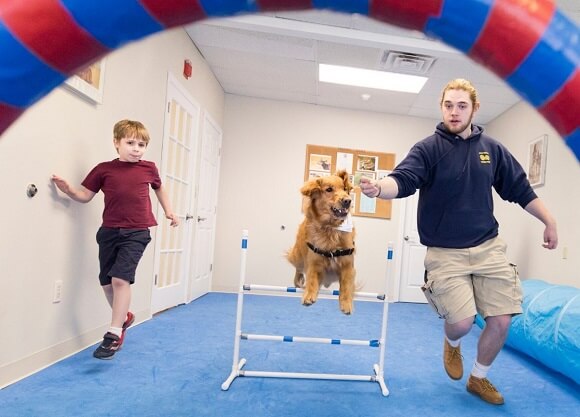
Internship offers unique perspective on power of animal therapy
July 19, 2018

July 19, 2018

The New Hampshire native gained tangible experience at Animal Assisted Therapy Services, which provides children and adults with physical, cognitive and psychosocial disabilities throughout Connecticut the opportunity to experience the unique human-animal bond as therapeutic intervention.
“Working with Animal Assisted Therapy Services has been an incredibly enlightening experience,” he said. “Working with this organization has taught me how to go about helping people in different ways. It taught me how simple activities can help a person unwind and express themselves.”
His classes at the university laid the groundwork for the successful internship experience, Richards said.
“Quinnipiac provided me with the tools to apply to real-life situations through the different theories and principles I’ve studied,” he said.
Chris Patella, founder and director of Animal Assisted Therapy Services, has been working with Quinnipiac interns since 2013.
“I have always found the Quinnipiac students to be extremely dedicated, conscientious, eager to learn and incredibly reliable,” she said. “The benefits of animal-assisted therapy has been documented for years. The unique human-animal bond provides comfort, healing and companionship. The animals serve as a bridge — or conduit — to build a relationship with the therapist, particularly when the client has suffered trauma. They are amazing creatures.”
Jim Buccini, an assisting teaching professor of sociology and internship coordinator at Quinnipiac, said he can’t overstate the value of an internship experience.
“The themes and concepts covered in our department have real-world application and implication,” he said. “We explore social interaction, culture and an ever-changing society. Experiential learning is intrinsic to what we study in our department. We also encourage our students to explore a broad range of internship opportunities.”
In addition, the experience helps students avoid narrow conceptualizations — which is why internships are required to enable our students to prepare for successful careers after Quinnipiac.
“Our students are not merely training for a profession,” Buccini said. “They are engaging in inquiry about social change, and sometimes participating in that change. One student may be interning with a federal law enforcement agency, while another is engaged in a domestic violence intervention program, while yet another is exploring community approaches to racial injustice. Again, the question asked is ‘Where does social change occur, how can I learn more about it and what can I bring to the table given the knowledge I’ve gained, and the skills I’ve developed at Quinnipiac University?”
And that is what Richards personifies so well.
“Liam has so much care and compassion for others,” Buccini said. “He is thoughtful about his role in the world, and I believe that is what drives him.”
Quinnipiac Today is your source for what's happening throughout #BobcatNation. Sign up for our weekly email newsletter to be among the first to know about news, events and members of our Bobcat family who are making a positive difference in our world.
Sign Up Now